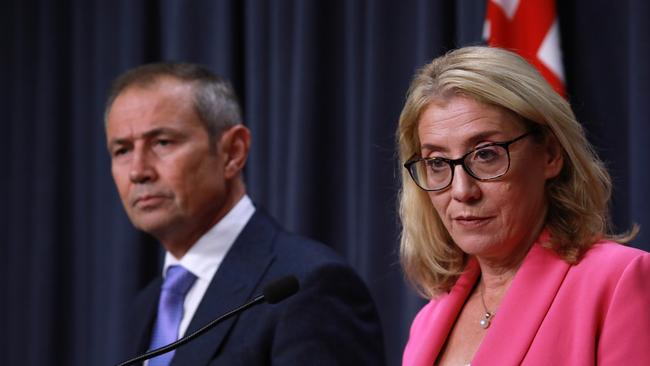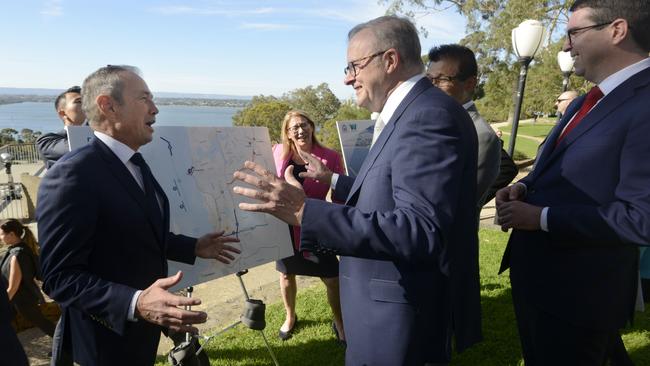Vulnerable families, apprentices, travellers and pensioners all offered cost of living relief in 2024-25 WA State Budget
Western Australian Treasurer Rita Saffioti will hand down her first state budget on Thursday, which is expected to keep the resource rich state in the black for the seventh consecutive year.

Western Australian Treasurer Rita Saffioti will hand down her first state budget on Thursday, where she is expected to deliver the state’s seventh straight year surplus.
The mid-year budget review in December forecast a $3.7bn surplus, but that could be even higher thanks largely to the income from iron ore royalties and WA’s contentious share of the GST.
Since 2018, the WA government has received a bigger slice of the GST allocation which has helped it continuously record a net surplus.
While other premiers try to fight for shake-up of the GST carve up, the WA government – which is a vital battleground for the federal election – has been given assurances from the federal government that there won’t be any changes to the agreement, which is expected to increase to 75 cents in the dollar this financial year.
It will be the first budget under Premier Roger Cook since the shock retirement of former premier and treasurer Mark McGowan last year.


Cost of living issues are also affecting the resource-rich state, and the Cook government has already announced a raft of measures to help families and the vulnerable.
The state government has already announced a raft of measures that will be funded in the upcoming budget to help vulnerable families and support services through the cost of living and housing crisis.
In one of the biggest pre-budget announcements made so far, the government has promised to inject $840m into social and affordable housing and homelessness initiatives.
Homelessness support services have experienced a huge spike in demand during the housing crisis, with Perth’s vacancy rate sitting at just 0.4 per cent in March this year.
The money will be used to increase supply and boost funding for homelessness support services to try and get more people into permanent accommodation.

To help bring more properties into the long-term rental market a new Vacant Property Rental Incentive Scheme will be allocated $5m.
The scheme offers payments to owners of up to 1000 vacant properties who are willing to provide a minimum 12-month lease agreement to new long-term tenants.
Food relief organisations such as Foodbank, OzHarvest and Second Bite will receive $500,000 each to put food on the tables of families struggling with increased living costs.
Other measures to help relieve household budgets will include energy bill credits, free public transport and free or reduced fee TAFE courses.

An additional $96.4m has been allocated towards the prevention of family and domestic violence.
Most of that money will be used to expand the operations of a Family and Domestic Violence Response Team and establish a ‘one stop hub’ for women and children.
If you are planning a getaway, residents in the northwest and travellers to and from the area will benefit from the state government’s Affordable Airfares Program.
Now in its sixth year, the program subsidises airfares between Perth, Broome, Kununurra and Exmouth on Virgin, Qantas, Airnorth and Nexus Airlines.
Pensioners in regional WA will also receive a $20.3m boost to their Regional Pensioner Travel Cards which will increase in value by $100 to $675 per year on July 1.
The card enables pensioners to travel more freely in regional areas where public transport is limited.

Apprentices in the building and construction industry are set to benefit from $52.3m to help them finish their qualifications.
Eligible apprentices will receive $1000 each time they complete a milestone throughout their training. They are also entitled to a $1000 rebate to buy tools and safety equipment at the start or end of their apprenticeship.
Employers of apprentices can also receive a grant of $15,000 or $12,500 depending on what year of the apprenticeship their employee is in and a bonus rate if they employ females or mature aged apprentices or trainees.
The state’s biggest creative arts sector employers will also receive a boost of $5.9m over the next two years which will see organisations such as the West Australian Ballet Company, Opera Company, Symphony Orchestra benefit from funding.


